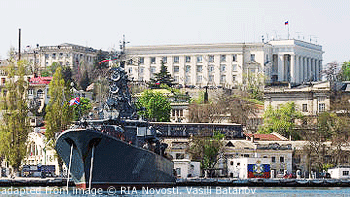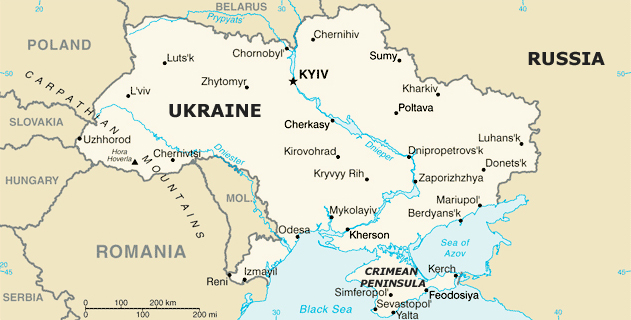Crimean standoff sees torn loyalties added to frayed nerves

(Business New Europe – bne.eu – Graham Stack in Sevastopol – March 12, 2014) The standoff in Crimea between Russian and Ukrainian forces is seeing torn loyalties add to the pressure on Ukraine’s penned-in units, epitomized by the position of Sevastopol’s illustrious Nakhimov naval college.
Head of Russia’s Black Sea fleet, 53-year-old Vice Admiral Aleksandr Vitko, the key military figure in Russia’s ongoing annexation of Crimea, was only appointed to his current post in 2013. But he is no stranger to Sevastopol, the Crimean port city that hosts both the Russian Black Sea fleet and the Ukrainian national fleet. Vitko trained here in the 1980s as a naval officer at the prestigious Nahkimov naval college in Sevastopol – now Ukraine’s national naval college.
Despite being Ukrainian today, the college retains the illustrious name of Pavel Nakhimov, revered as the heroic Russian defender of Sevastopol against British and French forces during the Crimean War, felled by a British sniper in 1855. “Five years of my life was bound up with training at the Nakhimov academy, so Sevastopol for me is basically my second home,” Vitko told a local paper shortly after his appointment.
Vitko, like many former Soviet officers based in Sevastopol, might have settled in Crimea and taken Ukrainian nationality – he is himself from Belarus, a landlocked country lacking a navy. But following graduation from Sevastopol’s Nakhimovka college, he was sent to serve in Russia’s Pacific fleet. It was not until 2013 that he returned to Sevastopol as head of Russia’s Black Sea fleet, where he celebrated the 230th anniversary of its founding by Catherine the Great following the conquest of Crimea.
Trust betrayed
The Black Sea fleet’s 230th anniversary celebration took place in “close collaboration” with the Ukrainian fleet: a focus of Vitko’s leadership was to strengthen ties with the Ukrainian navy that shares the same home port. “We collaborate (with the Ukrainian fleet) both in everyday life and in military exercises, this has always been a key priority for us,” he told the press at the time. The Russian fleet was actively involved with its smaller Ukrainian counterpart, even repairing ships at its own cost, according to bne sources.
Ukraine’s trust was betrayed on February 27, when a Russian-backed separatist government came to power in Crimea and the Russian Black Sea fleet closed down the Ukrainian navy, blockading bases and ships. Vitko and his men have exploited their insider knowledge gleaned from the close official collaboration, as well as the many friendships between officers of the two fleets. Vitko has gone from base to base of the Ukrainian fleet urging commanders to return weapons to the arsenals and vacate their premises.
His very own alma mater – the Nakhimov naval academy – was no exception: “Vice-Admiral Vitko came here, saying that there is now an independent government in Crimea, and that we should subordinate ourselves to it and pledge loyalty,” Commander Arkady Stepanenko, deputy head of the college, tells bne. “For all that he might be an esteemed alumnus, we refused to admit him, and warned that if he tried to enter the territory of the academy we would open fire… He told us that ‘self-defence units’ [of pro-Russian activists] would picket us, then he left.” At the time of bne visiting, the picket had left, but Russian forces maintained surveillance over the facility.
“Many officers of the Russian Black Sea fleet are in fact our alumni, but they are mistaken if they think this means we will open our gates to them,” Stepanenko adds.
For the student officers of the naval academy, many of whom are often locals from largely pro-Russia Crimea themselves, the crisis has been a test of loyalty. “Former schoolmates may be supporting the Russian side, but I am not even thinking of taking an oath to serve in the Crimean fleet, nor are any of the students here,” 21-year-old final year student officer Denis Kupchak, who is himself from Sevastopol, tells bne. “My parents are politically neutral, and support me personally.”
Between a rock and a hard place
Not all of the Ukrainian service men currently detained in their bases by incognito Russian forces can count on local backing. Officers of Ukraine’s 55th anti-aircraft division based in the coastal town of Evpatoria, penned in by a Russian unit, appealed to the townspeople on March 11 for moral support. “Having become pawns in a larger geopolitical game, our military collective is today in a very difficult position,” read an open letter addressed to local residents. “All the harder is it for us to hear from certain Evpatorians wounding and unfounded words. According to them, we are occupiers, people from some other region. For their information… the share of locals from the region of Evpatoria in our unit is over two-thirds. Many officers, sergeants and soldiers have grandparents and great grandparents buried in Evpatoria. But still they call us ‘occupiers’ – and greet as ‘their own people’ the Russian forces, entirely lacking any roots in Crimea,” the letter lamented.
At the same time, Colonel Matvienko, commander of the Evpatoria anti-aircraft division, in a letter to the Crimean leadership stalwartly refused to subordinate the unit to the new pro-Russia Crimean government and return weapons to the arsenals, as demanded by the secessionists. But he did commit his unit, as local residents, to “active participation” in the controversial upcoming referendum on Crimea’s political status on March 16, according to a copy of the letter circulated on social networks. That referendum is widely expected to seal Crimea’s annexation by Russia.
According to Dmitry Tymchuk, head of the Centre of Military-Political Research, “there is a worsening of morale across all our units. One general from the general staff told me today how he calls round all commanders several times per day to explain, even to plead, that they stand firm. But in the absence of any action from Kyiv, our lads are wondering more and more: why and for whom they should stand firm?”
Other reports show how Ukraine’s military in Crimea are at their wits’ end. In a demoralising setback, the commander of a Ukrainian motorised battalion in central Crimean city of Bakhchysarai, crashed his car under the influence of alcohol March 9. In fact he collided with a cavalcade touring Crimea in support of Russia in the run-up to the referendum. As a result, he yielded, or was forced to yield, his base to incognito Russian forces, with the Russian flag hoisted on March 10. According to reports, over half of the unit switched allegiance to the Crimean authorities or simply went home.
In a speech in Ukraine’s parliament on March 11, newly appointed Defence Minister Ihor Tenyukh – a native of West Ukraine’s Lviv and former member of nationalist Svoboda party – tried to explain the absence of action. According to Tenyukh, the fact that Russia refuses to acknowledge its hostile activities in Crimea means that Ukraine cannot declare a state of war. “Use of the armed forces in such a situation incurs criminal responsibility,” he said.
Tenyuk also acknowledged that Ukraine’s armed forces, despite their strong combat spirit, were not in a position to resist the Russian military. “Of 41,000 troops, only 6,000 are in fact combat-ready,” he told parliament, asking for funds to buy arms.

